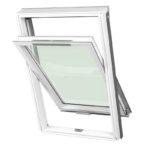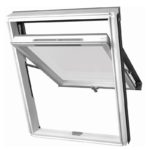Converting your roof space is a great way to add space to your house without the huge price tag. But navigating the rules and regulations of home development can be daunting. That is why we have created a handy guide for roof windows. By the end of this blog you will know exactly when to apply for planning permission and when to just get on with your conversion.
When it comes to installing roof windows, usually you do not need to gain planning permission, however there are some exceptions. You will need planning permission for your roof window if:

While these are the main exceptions in England and Wales, the rules are slightly different for those looking to install roof windows in Scotland and Northern Ireland
Article 4 exceptions
There are instances when planning permission is required even if you follow the above guidelines, this is known as an Article 4 Direction. Article 4 usually occurs when you live in an area protected by heritage or conservation status to ensure the status is not threatened by your changes.
You may still get permission to make changes to your property however it will have to be approved by local government before you begin work. The quickest way to find out if your area or property is protected under Article 4 Direction is to contact your local authority.
Balcony windows
Balcony windows have become increasingly popular during loft conversions to brighten a room and create more outside space on your property. While constructing a balcony does require planning permission under the Town and Country Planning Order , our range of balcony windows do not need planning permission. However, if you are completing any further renovations to create a physical balcony or terrace, you must contact your local authority to gain planning permission.
Next Steps

If you have decided you do need planning permission for your roof developments, you should contact your local authority at the earliest possible moment to keep delays to a minimum.
Another important step is to consider the installation itself. When making alterations to your roof you must ensure the changes will not negatively affect your property.
The best way to prevent structural damage or other development mishaps is to discuss any changes with a qualified contractor or contact us.
When making changes to your property, you must take into account any changes to your property’s thermal performance. Installing roof windows can decrease the thermal performance of your property resulting in lower energy efficiency and higher heating bills. Our range of roof windows have exceptional thermal performance to ensure you don’t lose money.
Our top picks
Now you know whether you need planning permission or not, here are our favourite roof windows to transform your roof space and make the most of your loft:

1. Top Hung – Opening outwards from the top of the frame, a top hung roof window is easy to install while being user friendly with a 180° rotation.
These are great for creating an unobstructed view of the skyline without taking up precious loft space. They are most suitable for pitches between 15° and 55° but larger pitches can also be accommodated for with special springs.

2. Centre Pivot – Centre Pivot roof windows are perfect for low and shallow roofs as they can be installed lower than a top hung window without obstructing the space.
Centre Pivot roof windows rotate 180° for easy cleaning and are most suitable for pitches between 15° and 90°.

3. High Pivot – with a higher axis of rotation, high pivot windows are great for cluttered spaces with low ceilings.
This style of window is also ideal for lofts with large furniture close to the window as it will allow air and light in without being obstructed be the furniture.

4. Skylights – Skylights are easy to install and are a great source of natural light to breathe new life into your roof space.
While they are not recommended for bedrooms or other habitable spaces due to their lower thermal performance, skylights are great for unconverted loft spaces and garages.
If you would like advice on the best roof window solutions to avoid planning permission while still providing exceptional thermal performance, talk to us today.